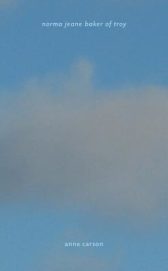 Anne Carson
Anne Carson
New Directions ($11.95)
by S. T. Brant
Norma Jeane Baker of Troy, the new poem-play by Anne Carson, is a formidable, defiant work. Those familiar with Carson’s work are accustomed to her accessible impenetrability—that sense that despite detecting some perfectly intelligible emotion, complete in itself, there’s always something lingering at the periphery. This is what makes Carson one of the most unique voices in contemporary poetry, with works such as Autobiography of Red, The Beauty of the Husband, her translations of Greek tragedies, and her seminal nonfiction study of love in ancient philosophy and literature, Eros the Bittersweet. There’s no other writer that can present such demands on a feather pillow for the reader, fuse erudition with insights so fluidly, and naturalize unorthodoxy in a manner preserving stylistic originality with timeless thought.
Reading Anne Carson is harvesting an abundance. Before you lies an immense field, rich with crops beyond measure, and you’re tasked with readying them; or you’re a horticulturist in Eden, cataloging creation, listing all the wilderness: this field work, this gardening, is reward past tally, but a Herculean labor nonetheless. She fulfills Shelley’s sublime standard: forsake the easy pleasures for the difficult; delay gratification for contemplation. In Norma Jeane Baker of Troy Carson gives us not an absurd theater but a negative one, and it requires that its readers rid themselves of certainty and ideology.
This is not a work with a plot that can be nailed down. The sole character is Norma Jeane, who is herself, Helen of Troy, and Truman Capote. The scenes fluctuate between Los Angeles and Troy as Norma Jeane’s identity fluctuates. In Carson’s negative theater, as one self empties itself out another fills that cask: the physical presence remains but the essence transmogrifies. As in all metamorphic works, we have a juggling of personas. Identity, to Carson, is always in a state of mixing up, combining, becoming something else through psychic osmosis or spiritual diffusion.
The dramatic design of this poem-play makes clear that Carson sees our figuring-out of our identities as an exhibition, no matter how private our conversations or internal self-algebra, staged in a frequented museum. We must wonder, Am I the only artwork in this place for the world’s flocking and observing, or is each of us a piece observed by another piece, exhibitions watching exhibitions? Desire, inner and outer, is a voice and a flashlight—we think the light is vital, but it is the voice we follow. Voice can lead in darkness. Light un-darks the dark. To Carson, the voice in the dark is preferable, because light can lead to illusion.
As the new world of Norma Jeane (AD) meets the classical world of Helen (BC), she takes on the self of Truman Capote desiring some mediation between herself and herself. Her image (her legend) is a wound; taken from her is a certainty about herself as she overhears who she is, enslaving her to the masses; Marilyn Monroe is a deception, othering Norma Jeane; when the opportunity to be someone, anyone, presents itself, her mind takes it and becomes that other, Truman Capote. The italicized words are central to the text, as many scenes are broken up by sections introducing a Greek word that gives a “lesson” about how the “History of War” has used this word as a concept. The Greek words (transliterated here; appearing in Greek script in the text) are: eidolon (“image, idol”), trauma (“wound”), Harpazein (“to take”), douleia, pallake (“slavery” and “concubine” respectively), apate (“deception, illusion, artifice”), barbarous (“other”), Kairos (“opportunity”), and tis (“someone, anyone”; this word changes grammatically based on the iota’s accent, an appropriately metamorphic word).
This newest publication by Carson, while not in the echelon of Autobiography of Red or the inspired puzzle Float, is nonetheless a worthwhile addition to her canon. The stage in your mind is the best place to let this poetic drama enact itself. The psyche and the text are so entwined in Carson’s cosmology that whatever joys her work gives in performance, her riches are best reaped from the page. You open your soul when you open an Anne Carson book, and you can feel, as you turn the page, something in you turn in conjunction.
